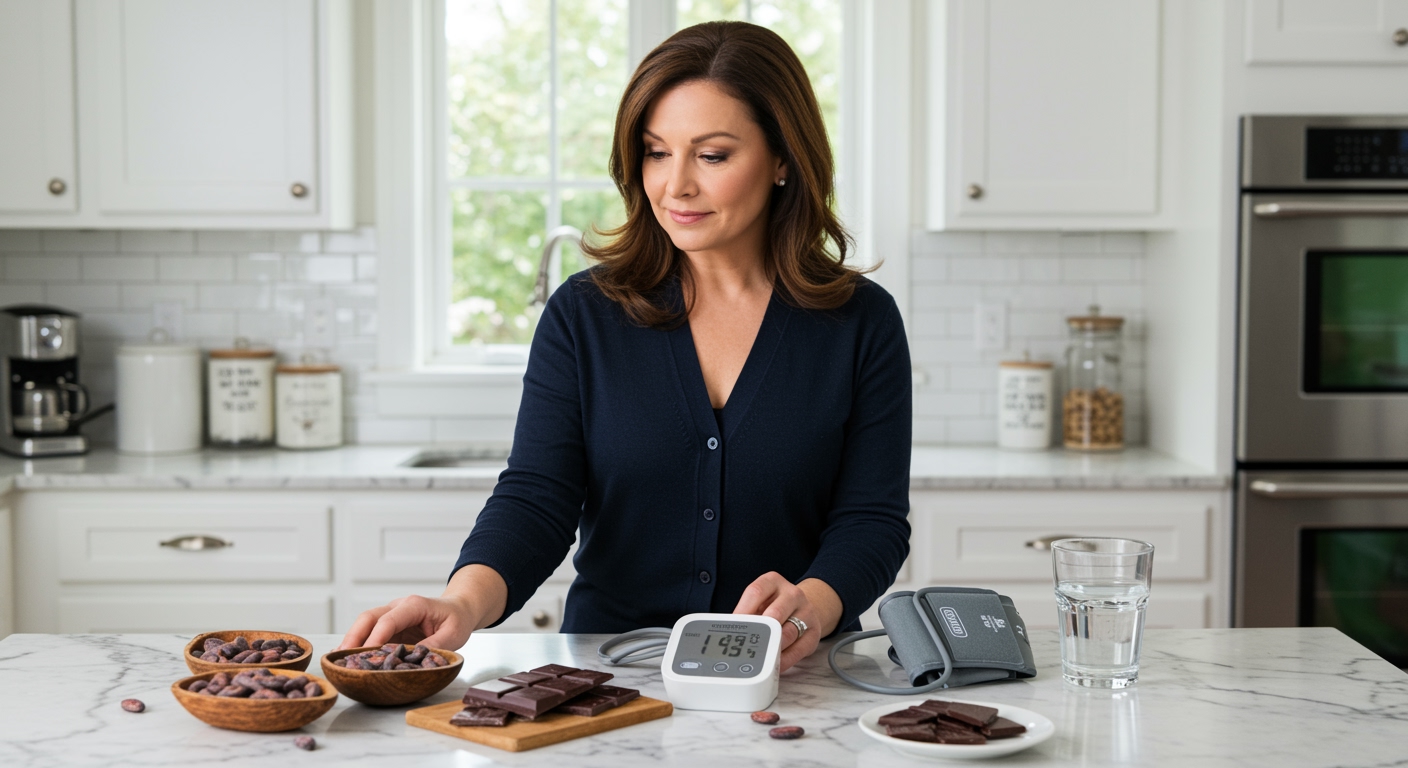✪ Key Takeaway: Dark chocolate with 70% or higher cocoa content can modestly lower blood pressure when consumed in small daily amounts.
Introduction
You reach for that dark chocolate bar and wonder if you are helping or hurting your blood pressure goals.
Many people with high blood pressure ask this question because they want to enjoy treats while still protecting their heart health.
Hi, I am Abdur, your nutrition coach and today I am going to explain exactly how dark chocolate affects your blood pressure and what you need to know to make smart choices.
What Makes Dark Chocolate Different From Regular Chocolate?
Dark chocolate contains much higher levels of cocoa solids compared to milk chocolate or white chocolate.
These cocoa solids provide powerful compounds called flavonoids, particularly a type called flavanols.
Flavanols work inside your blood vessels by helping them relax and widen.
When your blood vessels relax, blood flows more easily and your blood pressure naturally decreases.
Milk chocolate contains too much sugar and milk solids to provide meaningful amounts of these beneficial compounds.
White chocolate contains no cocoa solids at all, so it offers zero blood pressure benefits.
✪ Fact: Dark chocolate with 85% cocoa contains nearly 10 times more flavonoids than milk chocolate.
How Much Does Dark Chocolate Actually Lower Blood Pressure?
Research shows that dark chocolate can reduce systolic blood pressure by 2-5 mmHg on average.
The reduction in diastolic blood pressure is typically smaller, around 1-3 mmHg.
These numbers might seem small, but they can make a meaningful difference over time.
A 2 mmHg reduction in systolic pressure can lower your risk of stroke by about 6% and heart disease by 4%.
The effects usually appear within 2-8 weeks of regular consumption.
People with higher starting blood pressure tend to see greater reductions than those with normal pressure.
The benefits work best when combined with other healthy lifestyle changes like regular exercise and reduced sodium intake.
✪ Pro Tip: Track your blood pressure weekly to see if dark chocolate consumption creates noticeable improvements for you personally.
What Type and Amount of Dark Chocolate Works Best?
Choose dark chocolate with at least 70% cocoa content for blood pressure benefits.
Higher cocoa percentages like 85% or 90% provide more flavonoids but taste more bitter.
The optimal daily amount appears to be around 20-30 grams, which equals about 3-4 small squares.
This amount provides roughly 200-300 mg of flavonoids, which research shows as effective.
Eating more than 30 grams daily adds unnecessary calories and sugar without additional blood pressure benefits.
Look for chocolate with minimal ingredients – cocoa mass, cocoa butter, and a small amount of natural sweetener.
Avoid chocolate with added milk solids, artificial flavors, or excessive sugar content.
✪ Note: Raw cacao powder provides the highest concentration of flavonoids if you can tolerate the intense bitter taste.
Are There Any Risks or Side Effects to Consider?
Dark chocolate contains caffeine, though much less than coffee.
A 30-gram serving provides about 12-25 mg of caffeine, compared to 95 mg in a cup of coffee.
Some people experience headaches or sleep problems if they eat dark chocolate late in the day.
The calories can add up quickly – 30 grams of 70% dark chocolate contains about 150 calories.
Weight gain from excess calories can actually raise blood pressure, canceling out any benefits.
Dark chocolate also contains small amounts of oxalates, which may be problematic for people prone to kidney stones.
If you take blood pressure medications, monitor your pressure closely as the combination might lower it too much.
✪ Pro Tip: Replace other desserts with your daily dark chocolate portion to avoid adding extra calories to your diet.
When Should You Skip Dark Chocolate for Blood Pressure?
Skip dark chocolate if you have severe hypertension that requires immediate medical intervention.
Food changes work slowly, and dangerously high blood pressure needs fast-acting medications.
Avoid it if you struggle with sugar cravings or food addiction issues.
Even small amounts might trigger overeating episodes that harm your overall health goals.
People with diabetes should be extra careful about the sugar content, even in dark chocolate.
If you experience migraines, chocolate might be a trigger food for you.
Focus on proven blood pressure strategies first – reducing sodium, increasing potassium, exercising regularly, and managing stress.
✪ Note: Dark chocolate should complement, not replace, established blood pressure management strategies.
The Bottom Line
Dark chocolate with high cocoa content can provide modest blood pressure benefits when consumed in small daily amounts.
Smart nutrition choices add up over time, and small consistent changes often create bigger results than dramatic short-term efforts.
I would love to hear about your experience with dark chocolate and blood pressure in the comments below – have you noticed any changes, or do you have questions about incorporating it into your routine?
References
At NutritionCrown, we use quality and credible sources to ensure our content is accurate and trustworthy. Below are the sources referenced in creating this article:
- JAMA: Effects of Low-Habitual Cocoa Intake on Blood Pressure and Bioactive Nitric Oxide
- PMC: Dark Chocolate Consumption and Blood Pressure Reduction
- Nature: Cocoa Flavanol Intake and Cardiovascular Outcomes
- PubMed: Chocolate and Prevention of Cardiovascular Disease
- Mayo Clinic: Choose Dark Chocolate for Your Heart





